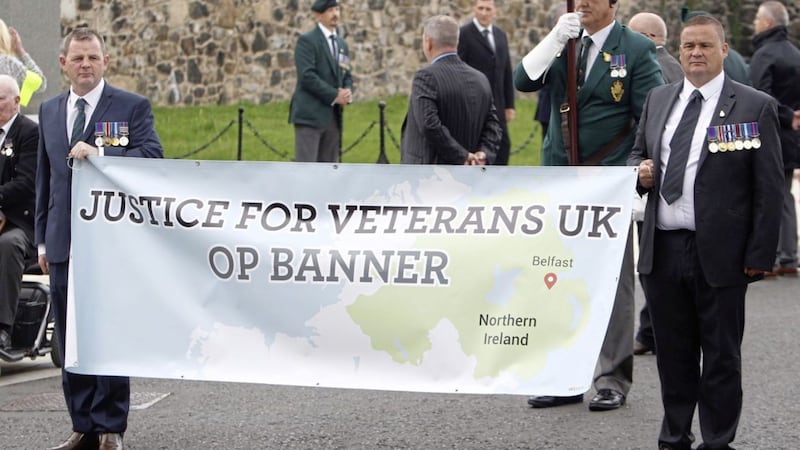The government has leaked plans to ban most further Troubles prosecutions - as close as the law permits to a general amnesty, which would require pardons.
Amnesty has been inevitable for decades. A similar plan was agreed between the government and Sinn Féin at the 2001 Weston Park talks and made it as far as a Westminster bill in 2005 before the SDLP exposed and sank it. At least seven other forms of partial amnesty have been introduced, from prisoner releases to the 2016 Stormont House agreement’s ban on non-death related prosecutions. There is a strong if painful case to be made for the latest move, although it should not have been announced unilaterally. What really squanders its advantages of compromise and resolution is that both sides keep presenting their tacit agreement as a disagreement: the government claims it is protecting former soldiers, while ‘regretting’ the ban applies to all; Sinn Féin claims it does not want any ban.
The truth and reconciliation the government is now promising cannot start with dishonesty about still being at each other’s throats.
**
The government timed its leak to the collapse of a trial into the 1972 murder of an Official IRA member. All prosecutions of former soldiers may now be re-examined but the case of one Bloody Sunday soldier may be viewed in a different light.
Another interesting detail in the government’s plan is that it still permits prosecutions for war crimes, genocide and torture. This is to avoid the UK falling foul of the International Criminal Court and having soldiers summonsed to the Hague. The Troubles were never approached legally as a war, although they could be considered a civil conflict under the Geneva Conventions, with all sides committing war crimes in those terms. If this becomes the only path to Troubles prosecutions, lawyers and campaign groups seem certain to explore it.
**
UUP leader Steve Aiken has said his party does not need to support an Irish language act because it did not “sign up” to New Decade, New Approach, instead returning to Stormont “on the basis of the Belfast/Good Friday Agreement”.
As with that agreement, no parties actually ‘signed’ New Decade, New Approach.
It was drafted by the government in a form implying all five executive parties had agreed to the deal in its entirety, having been “invited” to do so.
All references in the text are only to “the parties”, so one party could equivocate over the difference between actively supporting or just passively accepting certain parts. But the time to do this was when the deal was struck, 17 months ago.
**
There are three interlocking strands to the Good Friday Agreement: Stormont, north-south and east-west. Breaking any one supposedly severs the others. So the DUP’s on-off boycott of the North-South Ministerial Council over the past month (although it attended again this week) is indeed “unacceptable”, as Taoiseach Micheál Martin has declared.
However, the main east-west institution, the British-Irish Intergovernmental Conference, has not met since Boris Johnson became prime minister, despite the agreement requiring it to have “regular and frequent meetings”. Nor did it meet for a decade after the St Andrews agreement, despite being the review body for all three strands and hence technically the supreme Good Friday institution.
London and Dublin have just promised a return to regular meetings from next month. An explanation of past laxity would be useful.
**
There is something unpleasant about the mockery of Edwin Poots’ young earth creationism - a belief no less irrational than religion itself, nor one requiring scientific ignorance.
Free Presbyterians generally subscribe to the ‘test of faith’ view on science, by which an apparently Godless universe is divine trickery that must be studied to know God.
This is how they ace their A-levels, as I recall from school.
The real concern about the DUP minister’s creationism, missed by many of his critics, is that he may wish to impose it on others. Poots has said his views “coincide with” the Caleb Foundation, a pressure group within the DUP that has lobbied for creationist teaching in schools and exhibits in museums, most infamously at the Giant’s Causeway. DUP former minister Mervyn Storey, who sat on Caleb’s ruling council, is a prominent backer of Poots’ leadership campaign and would reportedly be one of his picks to head a Stormont department.
Also, Poots went to agricultural college, so he may not have aced his A-levels.
**
The 2004 Northern Bank robbery netted the IRA £10 million in untraceable notes, the bulk of which was used as a “pension fund” to buy off the IRA old guard, according to former taoiseach Bertie Ahern, in a BBC interview broadcast this week.
The allegation is not new but it raises a timely political question. Many people with a windfall 15 years ago would have put it into residential property and anecdotal reports suggest republicans were no exception. How much might this constrain Sinn Féin in regulating the private rental market?









